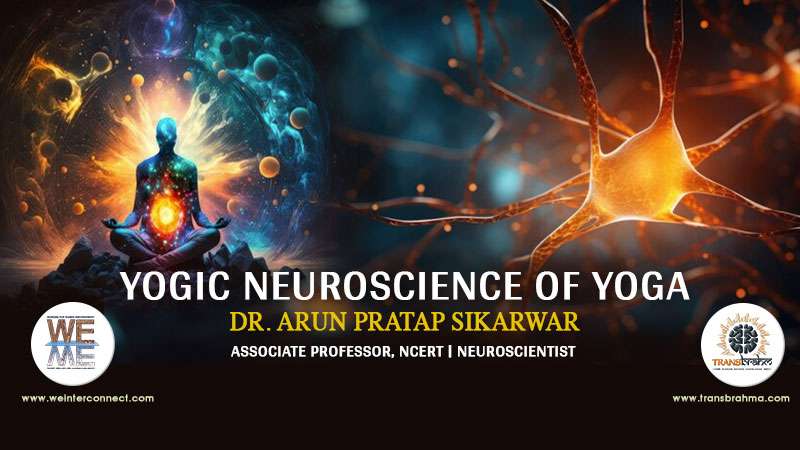Yogic Neuroscience of YOGA: Convergence of Vedic Indic Wisdom for Self-regulation and Resilience in today’s World
Yoga (Sanskrit: योग or ‘union’) is a group of physical, mental, and spiritual disciplines, which is supposedly originated in ancient India and is being almost accepted worldwide with optimistic note. There are plenty of schools of Yoga found in Hinduism, Buddhism, and Jainism. Various modified traditional and modern Yoga are being practiced worldwide now a days. The United Nations (UN) General Assembly established 21 June as the “International Day of Yoga”, and it has been celebrated annually around the world since 2015. On 1 December 2016, Yoga was enlisted by UNESCO as an intangible cultural heritage.

Yoga is one of the most popular contemporary health approaches practiced not only within India, but most of nations worldwide. Yoga is an ancient mind-body practice with rootedness in Indian philosophy. Yoga combines physical postures, rhythmic breathing, and meditative exercises to offer the practitioner a unique holistic mind-body experience. While the health benefits of physical exercise are well established in recent years, the active attentional component of breathing and meditation practice has garnered interest among neuroscientists, as the scientific evidence for the physical and mental health benefits of Yoga continues to grow.
Yogic Neuroscience is an intriguing interdisciplinary field that c onjoins ancient Yogic wisdom with modern neuroscience, comprising of study of the brain and mind. This field leads to understanding how Yogic techniques such as Asanas (physical postures), pranayama (breathing exercises), and meditation, affect brain anatomy (neuroanatomy), function (neurophysiology), with overall cognition and human mental health.
onjoins ancient Yogic wisdom with modern neuroscience, comprising of study of the brain and mind. This field leads to understanding how Yogic techniques such as Asanas (physical postures), pranayama (breathing exercises), and meditation, affect brain anatomy (neuroanatomy), function (neurophysiology), with overall cognition and human mental health.

Practicing Asanas enhances body awareness, which is essential for proprioception to better sense the position, location, and orientation of body parts. It also enhances interoception towards better physical and mental health. Regular practice of Yoga postures has been shown to reduce cortisol levels and thus stress buster, promoting overall well-being in mankind.
Pranayama is nothing but breathing exercises affecting primarily the inhalation and exhalation through the lungs. The pranayama techniques can modulate the autonomic nervous system, leading to a reduction in stress and promoting relaxation by positively influencing heart rate variability and other physiological markers. Such exercises can improve respiratory control through the hypothalamus and efficiency, which is linked to better mental and emotional health.
Yoga has proven “mind-body” connection which emphasizes the unity of mind and body, suggesting that mental situations can influence physical health and vice versa. Modern neuroscience provides noninvasive tools and techniques to study the cumulative outcomes of neuron-neuron interactions (brain interactome) to infer various states of human cognition. It is neurobiologically proven that long-term meditation does lead to subtle structural changes in the neuro-cytoarchitecture of the brain i.e., cortical thickening and gray matter density associated with attention, memory, enhanced cognition, and better emotional regulation. Meditation enhances neurofunctional connectivity between various sub-structures of the brain, improving cognitive processes and enhancing emotional quotient (EQ).
Read Also: NCC Girl Students about the real definition of Women Empowerment under WE

Yogic neuroscience has ample findings that show how Asanas, Pranayama, and Meditation positively affect the human brain and the overall functioning of many faculties of our mind. Practicing Yoga and meditation promotes neuroplasticity i.e., the ability to reorganize itself by improving neural connections of synapse. Neuroplasticity i.e., the ability of the nervous system to change its activity in response to intrinsic or extrinsic stimuli by reorganizing its structure and function leads to a better domain of learning and memory. Undergoing Yoga exercises enhances the regulation of emotions by influencing the hippocampus and amygdala, responsible for emotional brain regulation and consolidation of memory leading to reduced symptoms of depression and anxiety.
The involvement of regular Yoga leads to improved attention, concentration, and executive functions of the human cognitive domain, by positively affecting brain regions responsible for cognitive reserve. The parasympathetic nervous system, which promotes relaxation by reducing stress and depression levels, leads to decreased activity in the brain regions associated with levels of stress in the body. Yoga improves mindfulness and self-awareness leading to elevated insights into one’s emotions, behaviors, ideas, and thoughts. Mindfulness is about self-regulation involving better attention to our internal states and surroundings in a non-judgmental way. It helps in avoiding destructive habits and responses by learning to feel our thoughts, emotions, and experiences without negatively reacting to them.
By involving Yoga and meditation in therapeutic settings can decrease the symptoms of mental health conditions (e.g., depression, addiction, and anxiety disorders) in socially media entangled turbulent world. During the recent COVID-19 pandemic, the practice of Yoga and meditation was widely appreciated worldwide in the sufferings of human causalities, loss of jobs, and fear of human lives. Interventions of Yoga-based practices have proven enhancement in students’ cognitive capabilities and competencies. Regular practice sessions of Yoga and meditation at workplace has been reported to downgrade stress, enhancing productivity and well-being of human resources.
See More: https://weinterconnect.com
Dr. Arun Pratap Sikarwar
Associate Professor, NCERT | Neuroscientist | Science Communicator | TV panelist | TEDx speaker | Alumnus of Cornell U, Aarhus U Denmark, JNCASR, BHU, ICMR-NIRRCH
#Yogic_Neuroscience_of_YOGA, #yogaday, #yoga, #Yogic, #Neuroscience, #Convergence, #Vedic, #Indic, #Wisdom, #Self_regulation, #Resilience, #World, #health, #india, #training, #fitnessmotivation, #sport, #yoga, #peace, #healthylifestyle, #selflove, #crossfit, #selfcare, #wellness, #meditation, #energy, #mindfulness, #healing, #spiritual, #balance, #namaste, #human lives, #depression, #addiction, #anxiety, #disorders, #health_conditions, #mental_health, #Yoga_and_meditation,


